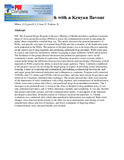| dc.description.abstract | PIP:
The Essential Drugs Program in Kenya's Ministry of Health included a qualitative research phase of focus group discussions (FGDs) to assess the communication needs in educating the public about responsible essential drug use. This article discusses the general parameters of FGDs, and specific outcomes of essential drug FGDs and the evaluation of the health education tools generated in the FGDs. The purpose of the pilot project was to develop effective materials on the correct use of drug regimens and promoting authorized drug providers. FGDs were used as a quick and relatively inexpensive means of gauging a target audience's beliefs and practices. The facilitator of the group directed discussion and probed for participants views on the community's needs, and forms of expression. (Drawing on positive social customs within a culture helps bridge the difference between local perceptions and knowledge.) Pretesting of draft materials in FGDs assured the ability to reach the target audience. These 2 methods contributed to the project's success by involving the target group as experts in providing useful information, fostering a sense of ownership and commitment, and building a relationship between the staff and target group that renewed dedication and willingness to cooperate. Program staff conducted 19 FGDs with 171 clients and 9 FGDs with 63 providers, and also interviewed 36 providers and observed in 4 locations client/provider exchanges. The results showed that client were unaware of the importance of strict compliance with a drug regimen, and consequences of ineffectiveness. Clients were uneasy about side effects, and purchased drugs from unauthorized dealers. The 3 messages to be promoted were 1) return to the clinic or hospital if drug problems arise, 2) use only authorized providers, and 3) follow directions carefully and completely. It was also decided that posters and audio cassette were the communication modes. A description of the materials developed is described. 24 health centers in 3 districts received the materials. A 3 month evaluation was conducted, after which time quantitative information was analyzed. Behavioral changes were observed in the returns to the clinic for more information, and closing of some unauthorized clinics and loss of business, and fewer complaints of lingering illness. Communication, trust, and good health care resulted. | en |

